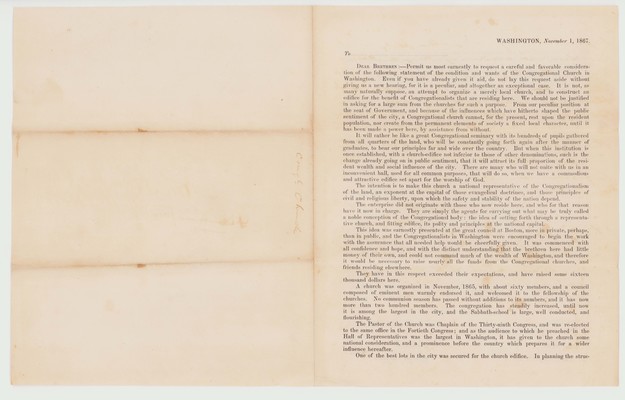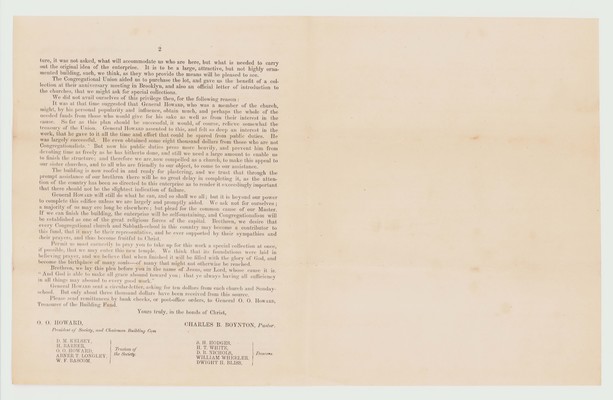Pages
Page 1
Cong.l Church WASHINGTON, November 1, 1867. To DEAR BRETHREN :-Permit us most earnestly to request a careful and favorable considera-tion of the following statement of the condition and wants of the Congregational Church in Washington. Even if you have already given it aid, do not lay this request aside without giving us a new hearing, for it is a peculiar, and altogether an exceptional case. It is not, as many naturally suppose, an attempt to organize a merely local church, and to construct an edifice for the benefit of Congregationalists that are residing here. We should not be justified in asking for a large sum from the churches for such a purpose. From our peculiar position at the seat of Government, and because of the influences which have hitherto shaped the public sentiment of the city, a Congregational church cannot, for the present, rest upon the resident population, nor create from the permanent elements of society a fixed local character, until it us been made a power here, by assistance from without. It will rather be like a great Congregational seminary with its hundreds of pupils gathered from all quarters of the land, who will be constantly going forth again after the manner of graduates, to bear our principles far and wide over the country. But when this institution is once established, with a church-edifice not inferior to those of other denominations, such is the change already going on in public sentiment, that it will attract its full proportion of the resi-dent wealth and social influence of the city. There are many who will not unite with us in an inconvenient hall, used for all common purposes, that will do so, when we have a commodious and attractive edifice set apart for the worship of God. The intention is to make this church a national representative of the Congregationalism of the land, an exponent at the capital of these evangelical doctrines, and those principles of civil and religious liberty, upon which the safety and stability of the nation depend. The enterprise did not originate with those who now reside here, and who for that reason have it now in charge. They are simply the agents for carrying out what may be truly called a noble conception of the Congregational body: the idea of setting forth through a representa-tive church, and fitting edifice, its polity and principles at the national capital This idea was earnestly presented at the great council at Boston, more in private, perhaps, than in public, and the Congregationalists in Washington were encouraged to begin the work with the assurance that all needed help would be cheerfully given. It was commenced with all confidence and hope, and with the distinct understanding that the brethren here had little money of their own, and could not command much of the wealth of Washington, and therefore it would be necessary to raise nearly all the funds from the Congregational churches, and friends residing elsewhere. They have in this respect exceeded their expectations, and have raised some sixteen thousand dollars here. A church was organized in November, 1865, with about sixty members, and a council composed of eminent men warmly endorsed it, and welcomed it to the fellowship of the churches. No communion season has passed without additions to its numbers, and it has now more than two hundred members. The congregation has steadily increased, until now it is among the largest in the city, and the Sabbath-school is large, well conducted, and flourishing. The Pastor of the Church was Chaplain of the Thirty-ninth Congress, and was re-elected to the same office in the Fortieth Congress; and as the audience to which he preached in the Hall of Representatives was the largest in Washington, it has given to the church some national consideration, and a prominence before the country which prepares it for a wider influence hereafter. One of the best lots in the city was secured for the church edifice. In planning the struc-
Page 2
2 ture, it was not asked, what will accommodate us who are here, but what is needed to carry out the original idea of the enterprise. It is to be a large, attractive, but not highly ornamented building, such, we think, as they who provide the means will be pleased to see. The Congregational Union aided us to purchase the lot, and gave us the benefit of a col-lection at their anniversary meeting in Brooklyn, and also an official letter of introduction to the churches, that we might ask for special collections We did not avail ourselves of this privilege then, for the following reason: It was at that time suggested that General HOWARD, who was a member of the church, might, by his personal popularity and influence, obtain much, and perhaps the whole of the needed funds from those who would give for his sake as well as from their interest in the cause. So far as this plan should be successful, it would, of course, relieve somewhat the treasury of the Union. General HOWARD assented to this, and felt so deep an interest in the work, but he gave to it all the time and effort that could be spared from public duties. He was largely successful. He even obtained some eight thousand dollars from those who are not Congregationalists. But now his public duties press more heavily, and prevent him from devoting time as freely as he has hitherto done, and still we need a large amount to enable us to finish the structure and therefore we are now compelled as a church, to make this appeal to our sister churches, and to all who are friendly to our object, to come to our assistance. The building is now roofed in and ready for plastering, and we trust that through the prompt assistance of our brethren there will be no great delay in completing it, as the atten-tion of the country has been so directed to this enterprise as to render it exceedingly important that there should not be the slightest indication of failure. General HOWARD will still do what he can, and we shall we all; but it is beyond our power to complete this edifice unless we are largely and promptly aided. We ask not for ourselves; a majority of us ere long be elsewhere; but plead for the common cause of our Master. If we can finish the building, the enterprise will be self-sustaining, and Congregationalism will be established as one of the great religious forces of the capital. Brethren, we desire that every Congregational church and Sabbath-school in this country may become a contributor to this fund, that it may be their representative, and be ever supported by their sympathies and their prayers, and thus become fruitful to Christ. Permits most earnestly to pray you to take up for this work a special collection at once, if possible that we may enter this new temple. We think that its foundations were laid in believing prayer, and we believe that when finished it will be filled with the glory of God, and become the birthplace of many souls—of many that might not otherwise be reached. Brethren, we lay this plea before you in the name of Jesus, our Lord, whose cause it is. "And God is able to make all grace abound toward you; that ye always having all sufficiency in all things may abound to every good work." General HOWARD sent a circular-letter, asking for ten dollars from each church and Sunday-school. But only about three thousand dollars have been received from this source. Please send remittances by bank checks, or post office orders, to General O. O. HOWARD, Treasurer of the Building Fund. Yours truly, in the bonds of Christ, O. O. HOWARD President of Society, and Chairman Building Com CHARLES B. BOYNTON, Pastor.
| DM. KELSEY | Trustees of the Society. |
|---|---|
| Η. BARBER, | |
| O. O. HOWARD | |
| ABNER T. LONGLEY, | |
| W. F. BASCOM, |
| S. H. HODGES, | Deacons. |
|---|---|
| H. T. WHITE, | |
| D. B. NICHOLS, | |
| WILLIAM WHEELER | |
| DWIGHT H BLISS, |

